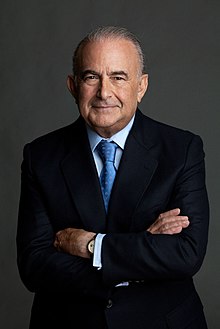Gustavo Cisneros
Gustavo A. Cisneros Rendiles (born June 1, 1945 in Caracas ) is a Venezuelan entrepreneur in the media and beverage industry. He is considered a Latin American media tsar. With a fortune of approximately $ 3.4 billion (according to Forbes ), he and his family are among the 150 richest people in the world .
Origin and career
Cisneros is the son of the Cuban entrepreneur Diego Cisneros. He studied business administration at the private business school Babson College in Wellesley , USA.
Diego Cisneros had operated a freight forwarding company in Caracas since 1929 and became a Pepsi concessionaire in Venezuela in 1940 . In 1960 he and his group of companies received the license for the private television broadcaster Venevisión , which was built on the basis of the bankruptcy assets of the private broadcaster Televisión Independiente, SA .
Entrepreneurial activity
In 1968, his son Gustavo took over the position of Chairman of the Supervisory Board and CEO of the Cisneros Group. At Venevisión, he expanded its production activities in the field of TV shows and telenovelas in the 1970s and 1980s . In addition, with the group of companies he acquired concessions from US companies in the food and entertainment industries, including a. from Burger King , Pizza Hut , Sears Roebuck, and blockbuster video stores.
In 1992, the Cisneros Group took over a significant share of Univisión , the largest provider of Spanish language television programming in the United States. This marked the beginning of the internationalization of the Cisneros Group, which in the following years invested in TV channels and pay-TV companies throughout Latin America, including Chilevisión and Caracol TV from Colombia. In 1996, the Cisneros Television Group was created as a sub-group.
In 2008, in addition to Venevisión, the group also included the Cervecería Regional , Americatel , the Miss Venezuela elections and the Leones del Caracas baseball team .
Political attitudes
Cisneros was a supporter of the liberal market policy implemented by the two-time President Carlos Andrés Pérez . After Hugo Chavez took office , he became one of the most prominent opponents of the president, who he feared would nationalize his Venezuelan TV and radio stations. For his part, Chávez is openly critical of Cisneros' media outlets, including after the Cisneros group broadcasters failed to cover the demonstrations for Chávez in the attempted coup against him in 2002. Cisneros has meanwhile relocated 80 percent of its business activities abroad, mainly to other countries in Latin America and the USA. The importance of the Cisneros group in the open opposition to Chávez declined with the consolidation of his rule.
Web links
| personal data | |
|---|---|
| SURNAME | Cisneros, Gustavo |
| ALTERNATIVE NAMES | Cisneros Rendiles, Gustavo A. |
| BRIEF DESCRIPTION | Venezuelan entrepreneur in the media and beverage industry |
| DATE OF BIRTH | June 1, 1945 |
| PLACE OF BIRTH | Caracas |
